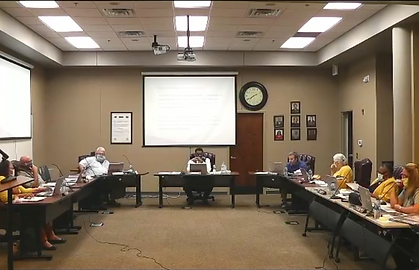Podcast Production
As a producer for the Southern Environmental Law Center's Broken Ground podcast, I crafted a seven-part narrative series about the people who fought the development of a crude oil pipeline through a majority Black neighborhood. Before that, I helped develop and launch episodes for Georgia Public Broadcasting's original productions as the station's first-ever podcast producer. In that role I helped launch of Georgia Today, which captured the week's biggest stories through the lens of the journalists covering it in the months before Georgia's pivotal role in the 2020 presidential election.
BROKEN GROUND SEASON 3, EPISODE 1
This is Boxtown, a neighborhood in southwest Memphis founded by formerly enslaved people who put down deep roots and residents who cherish their ties to this land. It’s also a neighborhood that’s seen decades of government neglect, while more and more polluting industries moved into the area. So, when the community first heard about plans for a crude oil pipeline that would cut through their neighborhood, they wanted to know more. They didn’t like what they learned.

Credit: Emily Richardson-Lorente

BROKEN GROUND SEASON 3, EPISODE 2
It was a throw away line by an out of town pipeline representative but it struck a nerve and came to define much of the resistance to the Byhalia Pipeline. In this episode hear the origin story of the phrase that rang throughout the fight: “the point of least resistance.” Intended as an engineering answer to a question about the pipeline route, it came to encapsulate so much of what the pipeline fight was about. And getting it out publicly began to draw new resisters to the fight.
Credit: Emily Richardson-Lorente
BROKEN GROUND SEASON 3, EPISODE 3
All of Memphis drinks from a world-class underground source, known as the Memphis Sand Aquifer. The realization that the Byhalia Connection crude oil pipeline, planned for southwest Memphis, could endanger they city’s water draws new allies into the pipeline fight. Soon, environmentalists like Ward Archer and Sarah Houston of Protect Our Aquifer are organizing alongside MCAP co-founders Kathy Robinson, Kizzy Jones, and Justin J. Pearson. The fight, which started as a neighborhood struggle against environmental racism, becomes a city-wide crusade for clean water. As Kathy Robinson says, “If it affects one of us, it affects all of us.”

Credit: Eli Motycka
STREAM THE REST OF THE BROKEN GROUND SEASON ABOUT ENVIRONMENTAL JUSTICE IN SOUTHWEST MEMPHIS HERE
Mistaken: The Real Case Against Richard Jewell is a 2019 PMJA award-winning, half-hour sound-rich retelling of how law enforcement and the media turned a hapless, innocent man into the presumed bomber. Using archival sound, interviews and an original score, Mistaken follows the rush to judgment spurred on by the demands of emerging online media, federal officials dealing with a wave of domestic terrorism, and a public eager to have answers and safely return to the games.

Credit: AP Photo / Greg Gibson

A series of raids across metro Atlanta and Macon stoked fears that child sex trafficking is more prevalent than previously thought. Johnny Edwards, an investigative reporter with the Atlanta Journal-Constitution, describes how the operation perpetuated a narrative of sex trafficking that doesn’t always square with the evidence.
Credit: U.S. Marshals Service
Deep in southwest Georgia, a local school board has been torn apart over racial gerrymandering. On Georgia Today, New York Times reporter Nicholas Casey discusses how the long shadow of voter suppression manifested in a voting map, and why electoral outcomes often come down to the lines we draw on paper.

Credit: Sumter County Schools

Credit: Robin Kemp, The Clayton Crescent
More than a week after the presidential election, Georgia is headed for an election audit including a hand recount prompted in part by allegations of election fraud — despite no evidence. How did we get here? On Georgia Today, Clayton Crescent founder Robin Kemp shares what she saw in the days after the election as the votes that put Joe Biden over the top in Georgia were counted.
Georgia Today takes an inside look at how the Centers for Disease Control and Prevention lost public trust amid an international health crisis — and how the repercussions of the organization’s unraveling could have long-lasting effects beyond the course of the COVID-19 pandemic. Host Steve Fennessy talks with Pulitzer Prize-winning journalists Patricia Callahan and James Bandler about their reporting for ProPublica.
Credit: AP Photo / Alex Edelman


Credit: AP Photo
For years, the Southern Strategy has been used by Republicans to great effect, but could 2020 spell the end of it? Angie Maxwell, co-author of "The Long Southern Strategy," joins host Steve Fennessy on Georgia Today.
QAnon is a vast conspiracy theory — and growing political movement — that has found fertile ground in Atlanta's far northern suburbs. On this week's Georgia Today, Atlanta Journal-Constitution investigative reporter Chris Joyner untangles QAnon's dark web of conspiracy theories.
Credit: AP Photo / Ted S. Warren


Credit: AP Photo / John Bazemore
The coronavirus pandemic has been especially deadly in nursing homes and assisted living facilities. On Georgia Today, Atlanta Journal-Constitution investigative reporter Carrie Teegardin discusses why facilities caring for the elderly have been so vulnerable to the virus, and how the pandemic has laid bare the state’s inadequate oversight. Then, Washington Post contributor Sidnee King tells us how the virus decimated the staff and residents of one facility in the heart of historic Atlanta.
For more than a year, a massive cargo ship has lain on its side just off the coast of St. Simon's Island in southeast Georgia. On Georgia Today, Brunswick News reporter Larry Hobbs discusses how the Golden Ray came to capsize in the first place, the tense hours as rescuers tried to free trapped crew members, and what emerged from hearings into the possible causes of the disaster.
